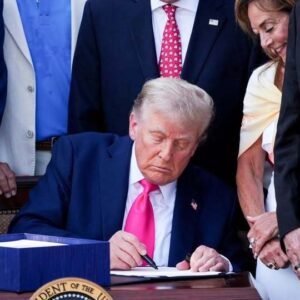The White House issued a sharp response after a federal judge temporarily blocked President Donald Trump’s executive order that had barred Mexican citizens from seeking asylum if they crossed the U.S. border illegally.
The decision, issued by U.S. District Judge Randolph Moss, an appointee of former President Obama, placed a hold on Trump’s asylum policy, arguing that it was inconsistent with existing immigration laws and constitutional protections. The ruling allows the federal government two weeks to file an appeal.
Stephen Miller, a senior Trump advisor and deputy chief of staff for policy, condemned the decision on social media, criticizing the judge’s reasoning and framing the ruling as judicial overreach.
“To try to circumvent the Supreme Court ruling on nationwide injunctions, a Marxist judge has declared that all potential FUTURE illegal aliens on foreign soil… are part of a protected global ‘class’ entitled to admission into the United States,” Miller wrote on X (formerly Twitter).
Background on the Policy
Trump’s executive order, titled “Guaranteeing the States’ Protection Against Invasion,” was introduced on the first day of his second term and effectively blocked asylum claims from migrants entering illegally through the southern border. Trump cited national security and public safety concerns in the move.
The order also resulted in the suspension of the Biden-era CBP One app, which had been used to manage border appointments. In its place, the administration reinstated policies requiring most asylum seekers to remain in Mexico while their claims are processed, and instructed agents to admit only those with valid visas or legal status.
Legal Battle Continues
The ruling from Judge Moss came shortly after a U.S. Supreme Court decision limited the use of nationwide injunctions, which often halt federal policies across the country. That decision was seen by many legal analysts as a major victory for the executive branch, allowing greater flexibility in implementing policy.
Moss, however, maintained that the Trump administration could not unilaterally create an alternative immigration system outside of what Congress has enacted. Immigrant advocacy groups had quickly filed lawsuits after the executive order, arguing that the policy endangers asylum seekers and violates established protections.
Border and Political Implications
Supporters of Trump’s policy say the asylum system is overwhelmed and often abused, pointing out that many applicants remain in the U.S. for years due to court backlogs, regardless of the legitimacy of their claims. They argue the new restrictions are necessary to regain control of the border and reduce illegal immigration.
Critics, however, maintain that the right to seek asylum is a fundamental protection enshrined in U.S. law and international agreements, regardless of how someone enters the country. Applicants must still meet strict criteria, including proving persecution based on race, religion, nationality, or political opinion.
Since the policy’s introduction, illegal border crossings reportedly dropped significantly, aided in part by Mexico’s increased enforcement efforts and similar restrictions introduced by the Biden administration in 2024.
As legal battles unfold, the ruling sets the stage for a broader debate over presidential authority in shaping immigration law—and how far executive orders can go in redefining long-standing humanitarian protections.





